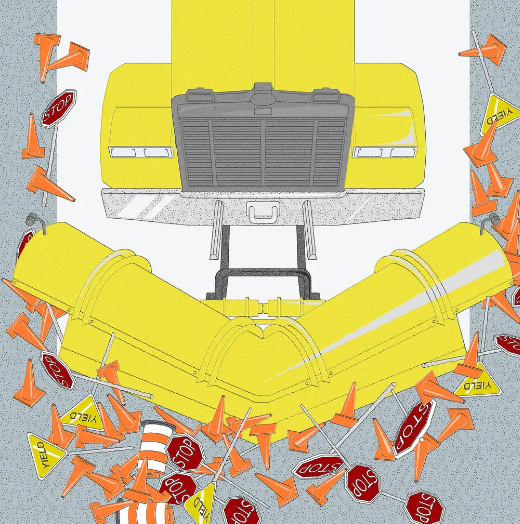这篇文章由Sophie S. Ding撰写,是我们第七届年度学生编辑大赛高中组的前9名获奖者之一,我们收到了6,076份参赛作品。

插图由《纽约时报》提供
There it is. Among the countless 100s, I see it: a 37. A hideous, black mark in the grade book. I had to nearly restrain my mother from pouncing on the phone to call my teacher. “Let me handle it,” I said. Uneasily and reluctantly, she did. She, thankfully, is not a snowplow parent.
According to an article in The New York Times, snowplow parents clear the road for their children to chug ahead on their perfect path to success. It’s why some students turn in homework handwritten by middle-aged adults, why a sophomore girl’s dad picks her up the period before every math test, why lunches flood the main office, delivered by parents of forgetful students. Perhaps students are all too happy to have parents control their lives. Or maybe parents don’t listen and need to run the show. Both need to rethink their positions.
Stellar grades and fancy admission letters seem like “proof” that parents’ meticulous managing and manipulating produces results. On paper, today’s seniors look successful: lists of APs, high test scores, varsity letters, unique community service projects, ability to play fifteen instruments while simultaneously winning chess competitions.
The reality? Dean Julie Lythcott-Haims of Stanford University observes these same students, now at prestigious universities, constantly calling home for advice, special packages, and help with basic tasks like registering for classes or contacting professors.
Beyond college, a poll by The New York Times showed that 76 percent of parents reminded their adult children of deadlines, 74 percent set up appointments and 11 percent called employers about issues at work. Parents, how long are you going to continue living two lives?
Overprotective parents limit teens’ opportunities to build skills needed in adulthood. Many parents feel that kids can’t succeed without nagging and protecting at every turn. This stunts kids’ growth and conveys that failure, life’s best teacher, is their worst enemy. The short-term gains of A+ report cards come at the long-term cost of sense of self. When failure is foreign to kids, what will they do in the real world where frustration and lost opportunities are commonplace?
Of course, parents need to be there when necessary, but not for tracking studying and extracurriculars and proofreading homework at night. Most of the time, let children govern their own lives to develop habits and skills for adulthood. Instead of putting answers in their mouths, guide them to solve their problems.
Let them mess up. Let them fail. No parent wants to see their child fail (the horror!), but failure is fundamental. My mom showed she respected me and my autonomy by letting me deal with my own problem. In the end, that one 37 taught me much more than all the 100s did.
Works Cited
Cain Miller, Claire, and Jonah Engel Bromwich. “How Parents Are Robbing Their Children of Adulthood.” The New York Times, 16 March 2019.
“The Effects of Helicopter Parenting.” Newport Academy, 2 Jan. 2019.
Haller, Sonja. “Kids Aren’t Growing Up: Shocking New Poll Says Parents Are Killing Kids’ Life Skills.” USA Today, 18 March 2019.
Jennifer Medina, Katie Benner, and Kate Taylor. “Actresses, Business Leaders and Other Wealthy Parents Charged in U.S. College Entry Fraud.” The New York Times, 12 March 2019.
“Parents’ Attitudes and Beliefs: Their Impact on Children’s Development.” Encyclopedia on Early Childhood Development, Dec. 2014.
Simmons, Rachel. “How Not to Be a Snowplow Parent.” The New York Times, 19 March 2019.
“Stop Doing Everything for Your Kids and Set Them on the Path to Independence.” Parent Co., 20 Nov. 2017.